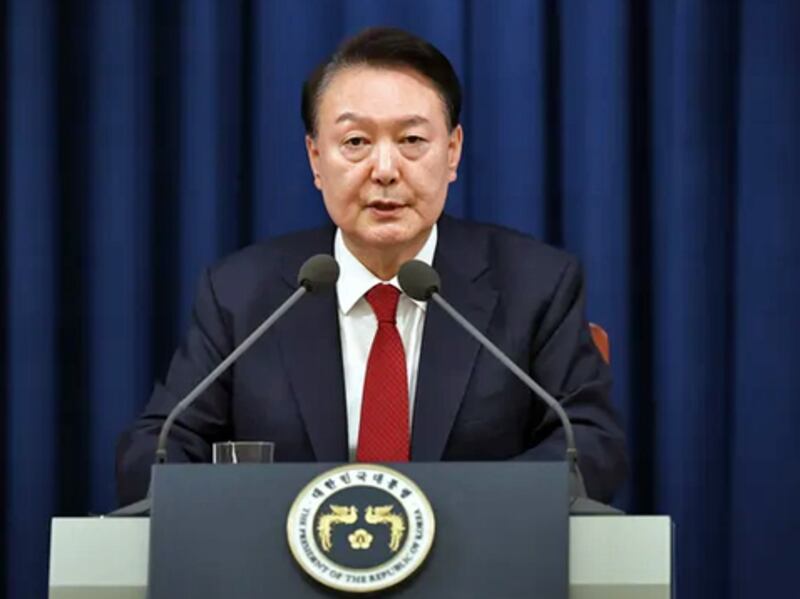Updated on Dec. 10, 2024 at 11:05 p.m. ET
Read a version of this story in Korean.
South Korea’s declaration of martial law last week was “shocking” and “wrought havoc,” North Korea’s state media said on Wednesday in the first coverage by the North of the political crisis in the rival South.
South Korea’s President Yoon Suk Yeol declared martial law on the night of Dec. 3 to counter “threats from North Korea” and “anti-state activities” by the domestic political opposition. But the National Assembly voted to reject the decree nearly three hours later as protesters rallied outside, and in response, Yoon lifted it.
“The shocking incident of the puppet Yoon Suk Yeol regime ... suddenly declaring a martial law decree and unhesitatingly wielding the guns and knives of its fascist dictatorship wrought havoc across South Korea,” the Korean Central News Agency, or KCNA, reported.
KCNA also reported details of the dismissal of an impeachment motion against Yoon in the legislature on Saturday after ruling party lawmakers boycotted the vote, a big rally after the impeachment motion was voted down and some comments from participants who called Yoon a “disaster.”
“Several helicopters and fully armed martial law forces, including the gangster organization, the Army Special Warfare Command, were deployed to seal off the National Assembly,” the North Korean state news agency reported.
“The international community is sternly watching, with assessments that the martial law incident exposed vulnerabilities in South Korean society .... and that Yoon Suk Yeol’s political life could face an early end,” KCNA said.
The same article was also published in the Rodong Sinmun newspaper, which is aimed at the general North Korean readership.
It was the first time in a week that North Korea has published articles criticizing South Korea. Up until last Wednesday, the Rodong Sinmun had regularly featured articles targeting Yoon, but this ceased the following day, the day after martial law was lifted.

In the past, political upheaval in South Korea has been widely reported in the North as evidence of the failure of capitalism.
For example, in 2016 and 2017 state media enthusiastically reported on disgraced South Korean President Park Geun-hye’s impeachment and trial, which led to a conviction on charges related to influence-peddling.
But that coverage of Park’s downfall did not have the intended effect because it exposed North Koreans to South Korea’s vibrant democracy and booming economy, said Jonathan Corrado, policy director at the New York-based Korea Society nonprofit organization.
“First, (the 2016 and 2017 coverage) revealed the extent of South Korea’s urban modernization, with Seoul’s Gwanghwamun Square lined with glass-covered high-rise buildings,” he said.
“Second, it showed the North Korean public the extent of South Korea’s civil society and democracy.”
Not an unusual silence
Yoon is a conservative and more hardline on against North Korea than his predecessor, the liberal Moon Jae-in, so Pyongyang may also be relishing his difficulties, Lee Hyun-seung, a North Korean escapee and lead program strategist at the Maryland-based Global Peace Foundation, told Radio Free Asia.
Lee, speaking before KCNA broke North Korea’s silence on Yoon’s troubles, said the North might be reluctant to speak out in the belief its intervention could unite southerners against outside interference.
“North Korea believes that President Yoon will be impeached … They are staying silent because they believe that if they step forward, they could provide an excuse for conservatives to oppose impeachment,” said Lee.
Yoon’s martial law order cited “North Korean threats” as its justification, even though it is widely considered to have been a political move targeting the opposition party.
Lee also said North Korea could mobilize its spy network to influence the situation in the South.
“There are organizations that operate to influence South Korea, such as the Unification Propaganda Department and the Reconnaissance General Bureau,” he said. “Since these organizations have to carry out operations against South Korea, they can deliver instructions through an underground network like in the past.”
Robert Rapson, a former senior official at the U.S. Embassy in Seoul, said the days of silence following the declaration of martial law was not surprising.
“It’s quite simple if you look at it from the North Korean perspective. Why provoke and provide any distraction from Yoon’s colossal political blunder and anti-democratic actions?” Rapson said.
Kang Vu, a visiting political science scholar at Boston University, said that North Korea was shifting its focus away from South Korea now that it is getting closer to Russia and is involving itself in its war with Ukraine.
“(That) gives it an incentive to maintain peace on the peninsula, and this pattern has been clear since the start of 2024,” said Vu.
RELATED RFA CONTENT
North Koreans in China shocked by South Korean martial law reversal
Photos: Martial law ends in South Korea hours after president declared it
In South Korea, the political crisis seems far from over.
The main opposition Democratic Party, or DP, is set to introduce a new impeachment motion against Yoon, which could be put to a vote at a plenary session on Saturday. By law, an impeachment motion must be voted on between 24 and 72 hours after it is reported to a plenary session.
The second motion is expected to include accusations that Yoon directly ordered martial law troops to seal off the National Assembly and arrest lawmakers, amounting to an act of insurrection.
Separately, the National Assembly will hold a plenary session on Wednesday and question officials involved in the martial law declaration.
Translated by Claire S. Lee. Edited by Eugene Whong and Malcolm Foster.
Update adds that North Korea reported on the situation on Wednesday.
